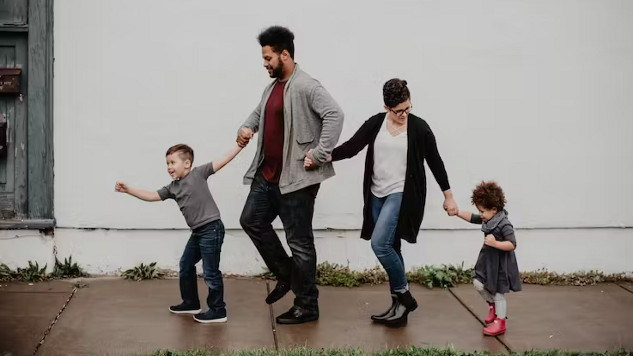
There is a huge amount of pressure on parents today – from feeding babies the “best organic purees” to making sure older children get all the developmental opportunities they could possibly need, while of course documenting the whole thing on Instagram.
There is also no shortage of advice about how to go about this. Just as there is no shortage of debate about the “best way” to parent your child.
But what if parents just focused on being a “good enough parent” instead? You do not have to be perfect in order to do a good job of raising a child. In fact, it may be better if you are not.
What is ‘good enough parenting’?
We know parenting matters in a child’s life. Research tell us parents influence their child’s development, resilience and expectations of themselves and others. This in turn determines their behaviour and wellbeing.
“Good enough parenting” theory was developed by UK paediatrician and psychoanalyst Donald Winnicott in the 1950s.
He found children actually benefit from mothers who “fail” them in some ways.
This does not mean parents can neglect or minimise their role in making sure children are safe where they live, learn and play. Children also need to have their emotional needs met. They need to know they are loved and feel a sense of belonging.
But good enough parenting recognises parental failure is an inevitable part of life. Experiencing sadness, tears and anger are part of childhood and parents should allow children to gradually tolerate some frustration. The good enough parent realises it is not possible to be available and immediately responsive all of the time.
What does it involve?
Winnicott noted when babies are very little, their needs are attended to almost immediately. If a baby cries, the parent will feed or change them.
But as the child grows, they do not necessarily have to have their needs met immediately. Parents can allow them to develop a tolerance for some uncertainty – or things not going the way they wanted – while still caring and responding to their basic needs.
This is important because life does not always go as we expect it to and children need to develop resilience.
What does good enough parenting look like everyday?
As a starting point, ask yourself “what does my child need from me?”
Good enough parenting focuses on tuning in to and responding to your child’s emotions and needs. These needs will change over time. For example, a good enough parent realises they need to respond quickly to their baby’s hunger cry. Whereas a teenager is learning to navigate life. A good enough parent will at times have to allow their child to face consequences of their choices.
At the same time, don’t try to “stop” emotions. Good enough parenting is about being there for your child if they are sad or angry, but not preventing them from being sad or angry in the first place. It can be helpful to think about suffering as not caused from emotional pain but from avoidance of uncomfortable emotions.
And don’t set unrealistic standards for your child. For example, if it’s dinner time and they are tired and hungry, don’t expect them to tidy their room.
Set boundaries
Being a good enough parent also means accepting your child for who they are. Children need unconditional love from a parental figure to develop a healthy sense of self. So, if you have a child who is more interested in soccer than maths (or vice versa) don’t try to change them.
At the same time, do set boundaries – such as “please don’t interrupt me when I’m talking” or “I’d like you to knock before you come into my room” – and try to be consistent about enforcing them. Not only does this help define your relationships (as a parent and child, not two friends), it also teaches your child about healthy boundaries in any relationship.
Things won’t always go to plan
As we know, things won’t always go as we want or expect. So if you feel angry with your child, model how to emotionally regulate and try to talk to them as calmly as you can. If you make a mistake – such as raising your voice or losing your temper – apologise.
But also find ways to give yourself a break. This means you will have the energy and capacity to parent tomorrow and into the future.
And ask for help when you need it. This could be from your partner, family or professionals, such as a GP, family counsellor or psychologist. Remember, this is about being good enough, not super human.![]()
Cher McGillivray, Assistant Professor Psychology Department, Bond University
This article is republished from The Conversation under a Creative Commons license. Read the original article.

Related Books:
Here are 5 non-fiction books on parenting that are currently Best Sellers on Amazon.com:The Whole-Brain Child: 12 Revolutionary Strategies to Nurture Your Child's Developing Mind
by Daniel J. Siegel and Tina Payne Bryson
This book provides practical strategies for parents to help their children develop emotional intelligence, self-regulation, and resilience using insights from neuroscience.
Click for more info or to order
No-Drama Discipline: The Whole-Brain Way to Calm the Chaos and Nurture Your Child's Developing Mind
by Daniel J. Siegel and Tina Payne Bryson
The authors of The Whole-Brain Child offer guidance for parents to discipline their children in a way that promotes emotional regulation, problem-solving, and empathy.
Click for more info or to order
How to Talk So Kids Will Listen & Listen So Kids Will Talk
by Adele Faber and Elaine Mazlish
This classic book provides practical communication techniques for parents to connect with their children and foster cooperation and respect.
Click for more info or to order
The Montessori Toddler: A Parent's Guide to Raising a Curious and Responsible Human Being
by Simone Davies
This guide offers insights and strategies for parents to implement Montessori principles at home and foster their toddler's natural curiosity, independence, and love of learning.
Click for more info or to order
Peaceful Parent, Happy Kids: How to Stop Yelling and Start Connecting
by Dr. Laura Markham
This book offers practical guidance for parents to shift their mindset and communication style to foster connection, empathy, and cooperation with their children.





















